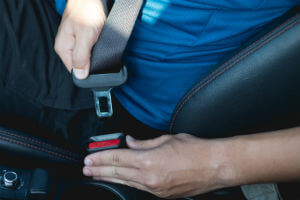
Seat belts save lives, statistics prove it. However, some people still forget or choose not to wear one while driving. This often happens on short trips because people do not expect to be involved in an accident.
However, an accident can happen anywhere at any time. If you do not wear a seat belt you could be much more likely to suffer severe injuries if a negligent driver hits you.
If you failed to wear a seatbelt and you were injured in an accident, you may wonder if you are still eligible for compensation. This is a complex issue that should be discussed with a licensed Savannah car accident lawyer.
The dedicated personal injury team at Roden Law is prepared to meet with you to discuss the specifics surrounding your claim and the legal options that may be available to you, even if you failed to wear a seat belt.
Seatbelt Laws in Georgia
Georgia requires a seat belt to be used by all drivers 18 years old or older. Front seat passengers must also use a seat belt.
Children ages eight through 17 must wear a seatbelt regardless of where they are seated in the vehicle. Children under age eight must be restrained in an appropriate child restraint device or booster seat that is suitable for them, based on their age and weight.
Violating any of these laws can result in the issuance of a ticket and the requirement to pay a fine.
What is the Seatbelt Defense?
The seat belt defense is a legal defense that a defendant in a civil lawsuit may use as evidence of the victim’s own negligence and to reduce the victim’s compensation award.
This defense is supported by the belief that a victim helped contribute to the severity of his or her own car accident injuries and the defendant should not have to pay more due to the victim’s own negligence.
Georgia law does not allow for the seat belt defense. Its seatbelt law specifically states that a person’s failure to wear a seatbelt “shall not be considered evidence of negligence” and should not be considered by the finder of fact to determine liability and “shall not be evidence used to diminish any recovery for damages” involved in a car accident.
What is Comparative Fault?
Comparative fault is a way to apportion liability between multiple parties when each party’s negligence contributed to the damages.
If the victim and the defendant both contributed to the accident, the victim’s amount of compensation would be reduced at an amount equal to his or her degree of fault. For example, if the victim suffered $10,000 in damages and is found to be 30 percent at fault for the accident, the victim’s recovery would be reduced by $3,000, or 30 percent.
Georgia uses a modified comparative fault system. That means if you are 49 percent at fault or less, you can still pursue a claim for compensation against the other negligent party. However, if you are 50 percent or more at fault, you cannot recover compensation for the damages you sustained.
What is Mitigation?
Under civil law principles, victims have a legal requirement to use reasonable efforts to avoid or reduce their damages. Some states apply this concept when a victim did not wear a seat belt. This concept is based on the idea that the victim’s damages would not have been as severe if he or she had worn a seat belt.
However, there are practical issues when applying this legal principle to seat belt non-use cases. Because this duty does not arise until after an accident has occurred, it may be arguable that conduct before the accident is irrelevant.
Contact Roden Law for Assistance
If you were injured in a car accident and you are concerned that the insurance company will try to use your failure to wear a seat belt against you, call Roden Law to discuss the situation. We understand the seat belt defense and how it may be used to reduce an accident victim’s damages.
We work on a contingency fee basis and charge no upfront fees, so there is no risk to reaching out to us to learn more about how we might be able to assist you.
